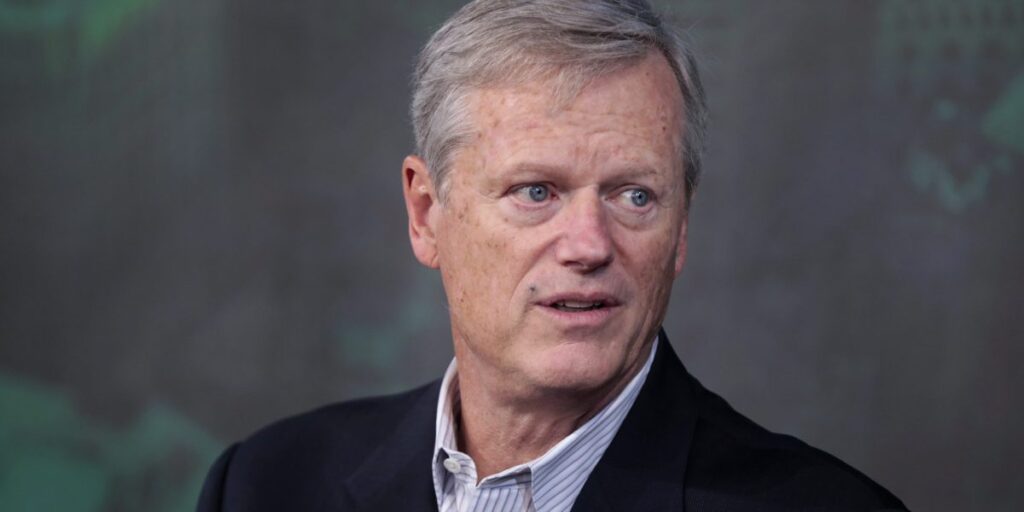NCAA President and former Massachusetts Governor Charlie Baker worries that prop betting is hurting college sports. In fact, he's so concerned that on Wednesday he called on state officials to ban them. That's a tough sell for the booming legal sports betting industry, which grew nearly 50% last year and is worth $11 billion. Even if Mr. Baker persuades states to put the genie back in the bottle, research shows that gamblers may turn to the black market instead.
Proposition bets, or “prop” bets, allow gamblers to bet on specific events within a game or on individual players, instead of traditional bets on who the winner will be or how many total points they will score. can. Regulators are concerned that prop bets are an easy target for players and gamblers looking to fix results. In fact, the NBA announced this week that it is investigating Toronto Raptors guard Jontay Porter amid speculation that he may have been illegally profiting from prop bets on his performance.
“Sports betting problems are on the rise across the country, and prop gambling continues to threaten the integrity of the sport,” Baker said. said in a statement released Wednesday.. “The NCAA has drawn a line under sports betting to protect student-athletes and protect the integrity of the game, but the incidents across the country in recent days show there is more work to be done.”
How did online sports betting begin?
Because sports betting is regulated state-wide, Baker said the NCAA plans to petition each state to outlaw prop bets in college sports, a policy that regulators such as Vermont, Ohio One state, Maryland, already enacted one earlier this year.
The Supreme Court overturned the federal ban on sports betting in 2018. Since then, 38 states and the District of Columbia have legalized some form of sports betting. Prop betting makes up a small portion of the total amount of gambling. Although there is no federal data, the Ohio Casino Control Commission reported last month that prop bets account for about 2% of all sports bets placed in the state.
But prop bets are getting a lot of attention, for better or for worse. From whether Taylor Swift will make it from Tokyo to watch her boyfriend Travis Kelsey's game in time to what Usher's first words will be during the halftime show, some of the funniest Super Bowl prop bets were posted last month. It attracted even more attention. But critics say prop bets can expose players to potential harassment, a point Maryland cited when it banned such bets earlier this month. There is.
Other high-profile sports betting scandals have raised concerns about the booming industry in recent weeks. Last week, Los Angeles Dodgers superstar Shohei Ohtani accused an interpreter of stealing millions of dollars to cover sports gambling debts. NBA head coach JB Bickerstaff recently reported that he had previously received threats from gamblers. Meanwhile, the industry has continued to grow. The American Gaming Association reported that last year's revenue reached nearly $11 billion, an increase of 45% from 2022.
What happens if prop bets are banned?
Prop bans represent such a small percentage of the market that even a widespread ban on college prop gambling would not be a major financial blow to the sports gambling industry, which has proven to be hugely popular. Probably not. However, the ban could have unintended consequences, such as encouraging gamblers to place the same prop bets through illegal sportsbooks rather than registered sportsbooks.
According to data from intelligence platform Yield Sec, illegal activities are carried out through means such as unlicensed bookmakers, unregistered websites, and sportsbook operations licensed in a different state or country than the one in which the user resides. betting is much more popular than legal sportsbooks. YieldSec analyzed betting data and predicted that of the estimated $6.7 billion wagered on this year's March Madness tournament, 63% would be wagered illegally.
Illegal gambling has been a thorn in the side of regulators since sports betting became legal nationwide in 2018. Valli said illegal gambling is outpacing legal gambling as interest in sports betting increases.
“You legalized and regulated [sports betting]. Now we have legalized it and created an uptick in activity into illegal gambling,” said YieldSec CEO Ismail Vali. luck.
A ban on prop betting, in line with what Baker is calling for, could accelerate this trend and risk pushing prop bettors to illegal platforms that can still offer prop bets.
Michael McCann, a professor at the University of New Hampshire and a sports law expert, said even if the NCAA succeeds in persuading states to rescind their approval of prop bets in college sports, that doesn't mean the process is over. Probably, he says.
“States may change what is permissible regarding sports betting, but any future changes may face opposition during the legislative process,” McCann wrote in an email. luck.


